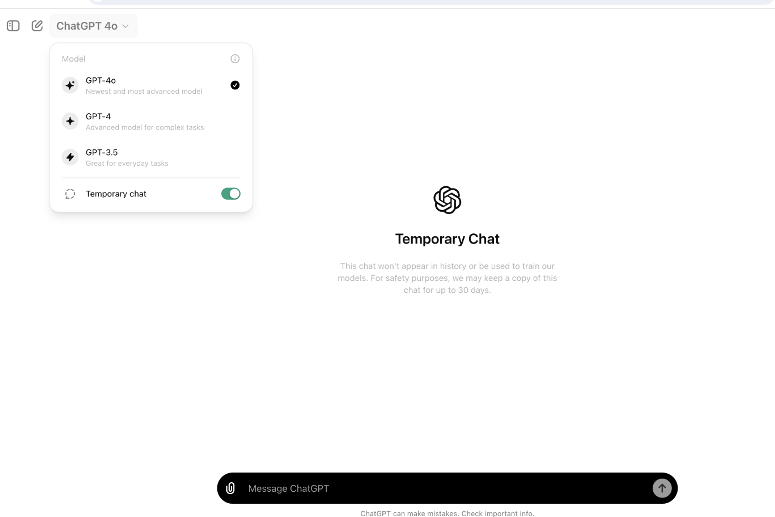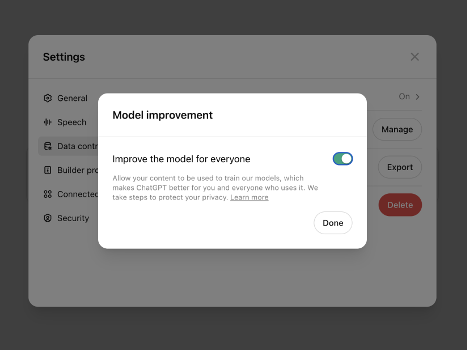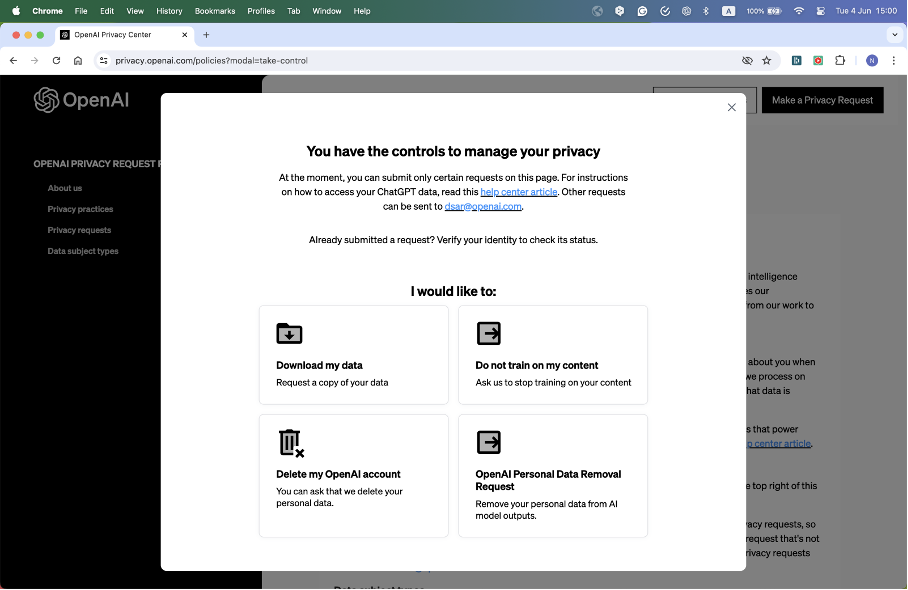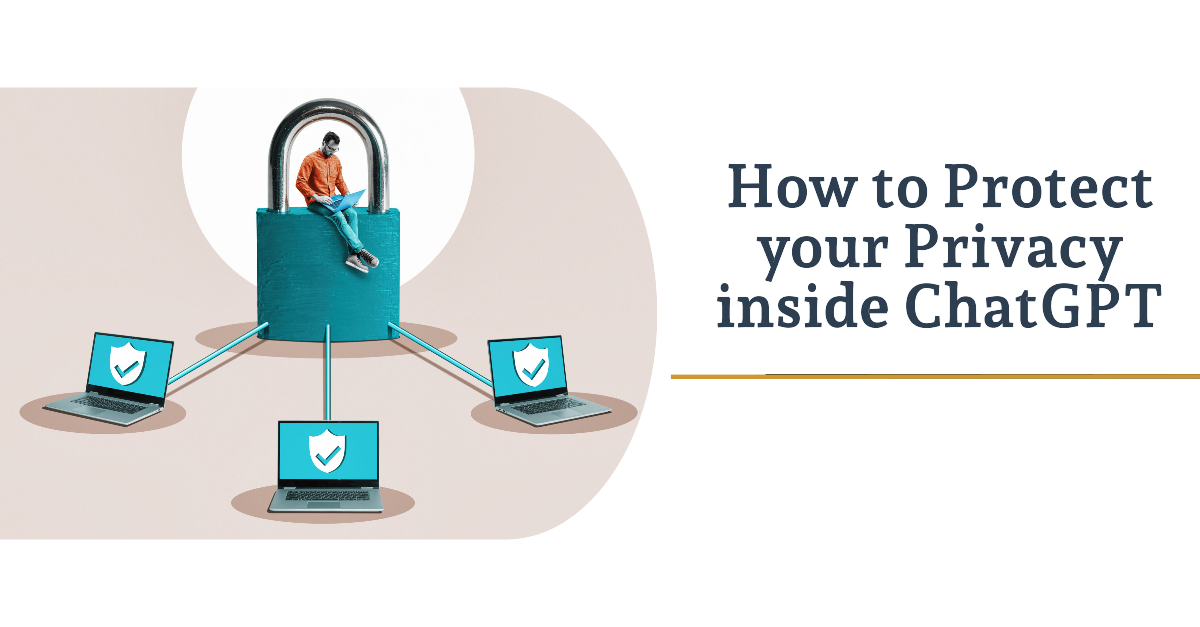We think it is fair to say that for many of our readers, ChatGPT has become an indispensable tool for studying or working. AI systems like ChatGPT have grown increasingly popular, and features such as file uploads make it easier to share data and documents. The quick and “good” analyses offer many convenient benefits, but it’s also important to understand what exactly happens with the information you input into such systems. Therefore, in this article, we explain how ChatGPT handles your data, what implications this has for your privacy, and how you can regain control over your own information.
ChatGPT Privacy: What happens to your conversations with ChatGPT?
When you use ChatGPT, your prompt, which includes the text you type and/or any uploaded files, is stored by the system. This applies to everything you share, from simple questions to detailed conversations. These stored data are used to improve the model, meaning the information you provide can be analyzed by the OpenAI team. This analysis aims to make the system better at giving accurate and helpful answers.
So, it’s not the case that once you finish a conversation, the input data you provided just disappears. The text and documents are recorded and can become part of the datasets used for further model training.
When you use AI models like ChatGPT, the inputs you provide, such as text, file uploads, and feedback, can be used to train and improve these models. Here’s what OpenAI says about how they use your data:
“Our large language models are trained on a broad corpus of text that includes publicly available content, licensed content, and content generated by human reviewers. We don’t use data for selling our services, advertising, or building profiles of people, we use data to make our models more helpful for people. ChatGPT, for instance, improves by further training on the conversations people have with it, unless you choose to disable training.” [Source]
"As noted above, we use Content [(i.e., input, file uploads, or feedback)] you provide us to improve our Services, for example to train the models that power our Services.” [Source: OpenAI's EU Privacy Policy]
ChatGPT Privacy Implications
Although the data you enter is not shared publicly, and OpenAI takes steps to protect user privacy, there is an important aspect to keep in mind: your personal information, such as names, locations, or other identifiable details, is not automatically removed from the stored data. This means that if you input sensitive or personal information, it could become part of the stored dataset.
By being mindful of what you share, you not only protect your own privacy but also that of others involved in the information you share with ChatGPT, such as course materials, research projects, and datasets.
Course Material and Privacy Sensitive Data
When using ChatGPT for academic purposes, such as uploading specific assignments or study materials, it’s important to pay extra attention to privacy issues. For instance, when you input university course materials like assignments, essays, or research data, this can sometimes include copywritten, sensitive, or confidential information. Examples include copyrighted course materials, case studies with detailed business data, research projects mentioning participants’ personal information, or theses discussing confidential research findings. Such information might accidentally be stored and potentially used for further analysis by OpenAI to improve the model.
Always follow the guidelines of your university or research institution to avoid unintentionally sharing information considered confidential or copywritten.
What Can You Do To Protect Your Privacy?
Here are several steps or think about them as some higher-level thinking exercises you can take or remember to safeguard your privacy when using an AI system:
Never Share Personal Information
Be cautious about sharing personal information such as your name, address, phone numbers, or other identifiable details. Limit your input to general questions or comments that do not contain sensitive information.
If you want to know what information ChatGPT has stored about you, you can simply ask a direct question. This can help you understand what data might be stored and how to be mindful of what you share in the future. An example of a question you could ask is: “What do you know about me based on our previous conversations?“
Use Aliases or Fictitious information
When you need to enter personal information, it is recommended to avoid using real names or specific details. Instead, consider using alias names or fictitious data that cannot be traced back to you or others.
For example, instead of sharing your own name or the name of a well-known person, you can choose a general name that reveals nothing about your identity. If you describe a situation related to a specific location, consider replacing the name of the city or specific detail with a more general term, such as “a large city” or “a well-known university.”
This approach helps you stay safe and protect your privacy without compromising the clarity or relevance of your question.
Ask for Removal of Your Data
Many AI systems, including some chatbots and large language models, offer the option to delete your stored data. Check if the AI tool you are using has a feature for removing stored information. This is usually not the default setting, so you may need to take action to activate it. Often, you can directly ask about the options for deleting data or go through the tool’s settings to see how you can remove certain information. If you have noticed that sensitive or personal data has been recorded that you would prefer not to be kept, take advantage of these options.
Be aware that you need to actively check if and how you can delete your data.
How can I protect my privacy in ChatGPT?
In short, when using AI systems like ChatGPT, it’s important to be mindful of your privacy. Here are some tips and steps to help you manage and protect your data better.
- Use A Temporary Chat
Use the temporary chat feature to prevent your input in a single session with ChatGPT from being used as training data.
Temporary chats are deleted from systems within 30 days but are still reviewed to monitor for abuse. However, they will not be used for model training purposes. Existing conversations, on the other hand, will still be saved and may be used for model training unless you have opted out.

2. Opt Out of Training Data Collection for Every Chat
OpenAI allows users to opt out of having their data used for training across all chats. You can disable the usage of your inputs for training on different platforms by following the steps below:
- Web Interface (Logged Out User):
- Step 1: Click on your profile icon at the top-right corner of the page.
- Step 2: Select Settings from the menu.
- Step 3: Navigate to Data Controls.
- Step 4: Disable the option “Improve the model for everyone.”
- iOS App:
- Step 1: Tap the three dots in the top right corner of the screen.
- Step 2: Select Settings from the dropdown menu.
- Step 3: Go to Data Controls.
- Step 4: Toggle off the option “Improve the model for everyone.”
- Android App:
- Step 1: Open the menu by tapping the three horizontal lines in the top left corner of the screen.
- Step 2: Select Settings.
- Step 3: Go to Data Controls.
- Step 4: Toggle off “Improve the model for everyone.”
When this setting is turned off, the conversation will still appear in your chat history bar (on the left-hand side of the screen). But the conversation will not be used for training.

3. Request Deletion of Personal Data
If personal data appears in outputs after some time, or you want to assure yourself to have no personal data stored, you can request to have this data deleted from the model’s outputs.
Step-by-Step:
- Step 1: Visit the OpenAI Privacy page.
- Step 2: Locate the section on Data Removal Requests.
- Step 3: Follow the provided instructions to submit a request to have specific personal data removed.
- Step 4: Provide necessary details of the data to be deleted, if required.
- Step 5: Submit your request and await a response from OpenAI confirming the deletion process.

Closing Thoughts
ChatGPT is a fantastic tool for your studies with many applications, but using it also involves privacy considerations. By understanding what happens to the information you input, you can make better-informed decisions about how to use this tool. Be cautious about sharing personal data and be aware of ways to protect your privacy. By following these measures, you can fully benefit from ChatGPT while keeping your privacy.




